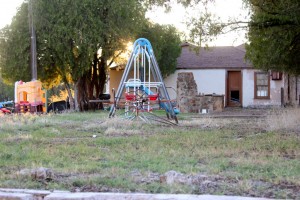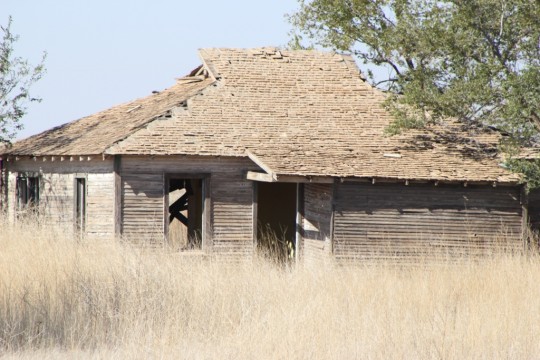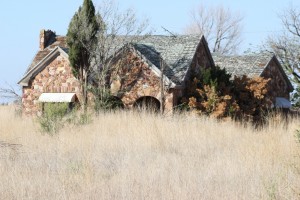I don’t know what else to call them. But if they were all in the same vicinity or neighborhood, they’d be part of a ghost town. They’re usually uninhabitable, with windows and doors gone or broken, and the roof letting in morning sunshine.
There’s at least one near you somewhere, but it may not be as easy to see as the hundreds that dot the wide open landscape near where I live.
Abandoned, but never empty. For lack of a better term, I call them ghost houses.
Not haunted houses, though I’d rather not wander into one of these things after dark. Broad open daylight either, for that matter.
Once upon a time these places provided a home for families. Now they sit empty. Sometimes the reason is obvious; sometimes it doesn’t make sense at all. Just in the last week I’ve seen several once-lovely and spacious homes now left to the elements, vandals, and critters.
Maybe someone died, and left no heir. Maybe business dried up or sold out and forced a move. Maybe the place got tied up in some sort of disagreement in court or with a bank.
Regardless, the end result is the same – empty, eroding testaments to lost usefulness and life.
Oh, if they could talk! Oh, if they could teach us!
Call me weird (okay, who said that?). But what started as a years-long fascination has led me to visit and photograph over 200 of these old places over the last week. Most were houses. But there are also old stores, gas stations, barns, schools, and even a few abandoned churches.
Some are part of the three certifiable ghost towns I’ve visited (a story for another day). Most stand alone on the edge of town or in the middle of nowhere.
Nobody built one of these planning for them to sit desolate. But sit they do. And while the ghost houses have lost their primary purpose because nobody can actually live or work in them anymore, they being dead still speak.
And no, they’re not hollering, “Boo!”
They’re teaching some powerful lessons that speak to us as individuals and leaders, churches and organizations.
The walls are talking, friends. Maybe it’s time to listen.
1. Change happens – deal with it or die.
Without exception, every one of these structures is the victim of a change. Maybe it was a change in ownership, or a change in sociology. Maybe it was a change in the economy or a change in family dynamics. Regardless of the specifics, a ghost house became a ghost house when the change happened and there was no more vision for how the house fit in to the change.
You may have gotten laid off for the same reason. I’m sorry. Now deal with it.
You may have experienced something like this when the doctor told you to retire before you were ready.
You may have experienced that when a new sheriff (or pastor or supervisor or principal or teacher or CEO) came to town. Yeah, I know you miss Brother Bodacious or Sister Awesome. Send ‘em some pecans for Christmas. Meanwhile, you need to adjust to the changes that are presenting themselves to you or you could be the next casualty.
2. Be a solution to someone else’s need.
Ghost houses sit empty because there is no demand for them – they aren’t the solution to anybody’s problem or the fulfillment of anybody’s dream anymore.
That doesn’t have to happen to you. It doesn’t have to happen to your business or church. But it will happen unless you recognize that what people needed in the 1970s is different from the questions they asked in the 1980s is very different from the challenges they faced in the 1990s. And your awesome answers from back in the day may no longer be meeting the needs or answering the questions people are asking today.
I’m not talking about changing your truth claims. But I am talking about taking a ruthless look at your methods. Otherwise, you or your organization may be the next ghost house.
 3. Home is where the people are – houses are just a shell.
3. Home is where the people are – houses are just a shell.
Nobody ever bought a home. The realtors just tell you that because it helps sell houses. Homes are made by the people who occupy them. The good news is that a lost house doesn’t have to mean a lost home.
I’d be lying if I said I didn’t feel a bit of sadness for some of the ghost houses I saw. At one place they left so fast they left the children’s swing sets, a riding mower and a trampoline – all signs of life.
But the real life was found in the inhabitants.
In a similar vein, your body functions as a shell container for the real you. And yet we sometimes get our priorities out of whack when it comes to what’s most important. We can spend hours and dollars on the shell (body), but neglect the soul – the real you.
And don’t get me started on church buildings. I’ve been in places that treated the structure like a sanitized palace, to the neglect of the people inside (or in the neighborhood). And like the Taj Mahal, without a change, the church building will soon become a tomb.
4. There’s something to be said for maintenance.
This is the balance to the previous point. The ghost houses are falling apart because of neglect. The same could be said about your body or your facility. And often neglect of the shell is a reflection of a much deeper problem.
I’ll bet you can tell which of the restaurants in your town will go out of business next. Usually it’s the one that neglects the upkeep of the building the most. Why? Because it’s often that the business is in trouble.
Maintenance of your “shell” is a reflection of your self-respect. Or lack thereof. And if you don’t respect yourself…
5. Life goes on, with you or without you.
I never saw the first ghost house with a line of people standing outside, wishing they could get in. Life and the world of houses moved on and left them behind.
The same could be said about you, your organization, or your leadership. You are not immortal. You are not irreplaceable. But that’s not to say you are not important. Your task and mine is to see to it that we make ourselves necessary and align ourselves with the needs and opportunities that present themselves today, and the ones that may appear on the horizon tomorrow.
6. Failure to plan for a successor can leave a house (or an organization) empty.
Somebody lived in the ghost houses for the last time. When they left, there was no successor. There may be good reasons for that, as in the case around here when the family farm was sold to a corporate operation. But whatever the reason, the houses began decaying the minute the last occupant left.
If your goal is to sustain your church, business, or nonprofit, you’d better know where it’s headed after the current administration is history. You don’t have to select the next leader. But you do have to equip somebody in the organization to do it.
7. In a free society, failure is always an option.
I kept wondering as I passed the farm houses – Is this the result of somebody leaving wealthy because they sold out, or the result of somebody leaving broke because they bottomed out? Either way, you have free enterprise and capitalism to thank or blame.
The alternative: Let the government own all the houses. Or at least step in and bail out the ghost houses. Or ghost car manufacturers. Or ghost banks. Sorry… got distracted.
Opportunity to succeed must not come at the expense of protection from all risk. It doesn’t work in economics. It doesn’t work in business. And it certainly doesn’t work in raising a family.
I knew very little about the stories behind the ghost houses. But one thing I did know. Call it cruel or harsh, but some of these houses were empty because somebody failed, and the government or family wasn’t there to pick them up. Should they have been? I guess it depends on what sort of economic system you want – one that limits the upside and protects everybody’s downside, or one that leaves the results to hard work, creativity, industry, and this thing called “the market.”
Oh, if these walls could talk! Come to think of it, I think they have been.

